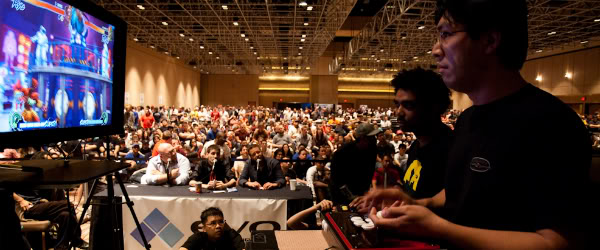Editor's Note: Daryl's description of diversity at fighting game tournaments sounds like the Street Fighter 2 world map come to life. If you had told me back in 1992 that one day a guy from Japan would use Blanka to fight a guy from Brazil using Ryu, I would've thought you were crazy. Heck, the mall arcade near my grandparents felt like a foreign country at the time, and that was only two hours from home! -Brett

Dan from Japan (front) and Jason Cole were among the 1,040 players competing in the Street Fighter 4 tournament at Evolution 2009. Photo by Kara Leung.
At Evolution 2009, the biggest and best fighting game tournament out there, the top story going into the qualifying rounds was that 1,040 people had registered to play Street Fighter 4. This massive amount of entries clearly broke all records for tournament play, proving that the fighting game community has come a long way from its humble beginnings in the local arcade scene. In addition, a staggering 23,000 people of all races, ages, and levels of interest in Street Fighter tuned into the Evolution Web stream to watch the final match between Japan's Umehara Daigo and America's Justin Wong.
While Daigo's impressive victory in SF4 ended this chapter in international fighting game competition, it's the diverse make-up of those 23,000 people that's a greater, more significant achievement.
At times like this, I reflect on something that UK Street Fighter player HarmoNAZ said about fighting games being a global community: "One thing that motivates me [to keep playing] is meeting the people. How many other things can you offer me, where you can say that I can go to any random place, I can meet a guy of any nationality, religion, and belief, and we could not care less. It's like, 'Mate, get out your stick. Let's play.'"
Back in the day, our scope of the video game scene was limited. Who was the best on the block? Who was the best at the arcade? Who was the best in the region? When one person traveled from another city or state to compete, that person suddenly personified how everyone in his region played.
Today, our scope has widened significantly thanks to the Internet. It's not uncommon to get players together from all over the world. The beauty of fighting game tournaments is that no one will have the same background, upbringing, culture, or style as the next person in the bracket.
I once played a Mexican gamer who could not speak an ounce of English. For those who don't know me, I'm a 20-year-old Filipino dude, and for competitive Street Fighter that's pretty young. This man I was playing was significantly older and probably lived in a completely different town than me. However, we understood each other perfectly when we walked up to the sticks to play our match. Each of us said to ourselves, "I want to win this tournament, and I'm going to defeat you to do so." Thoughts analyzing each potential situation of the match raced through my mind, and I bet that the guy standing next to me was thinking the same things, only in Spanish.
[video:http://www.youtube.com/watch?v=ijhUJTZrxLk 480×295]
Crowd reaction during Evolution's Street Fighter 4 grand finals.
Now let's look at some of the winners of this past Evolution. Street Fighter 4 champion Daigo Umehara hails from Japan. Soul Calibur 4 champion Jonathan "Malek" Ledy lives in France. Abdulatif "Latif" Alhmili was born in Saudi Arabia and won the Guilty Gear XX: Accent Core Plus singles tournament. African-American player Sanford "Santhrax" Kelly won his first Evo Marvel vs. Capcom 2 tournament. The week before, at the Genesis tournament, Swedish Super Smash Bros. Melee player Armada shocked the U.S. Melee scene by giving undisputed American champion Mango a run for his money. Every corner of the world has been represented in the fighting game scene and has shown skill in tournament play.
I think this sense of unity across cultures is what has allowed the fighting game genre to survive into its second decade. Sure, the person standing next to you in the sign-up line may be a different race or age than you. Maybe they live a vastly different lifestyle. With fighting games, it doesn't really matter. Put a controller or joystick in our hands, and we're all just gamers.

